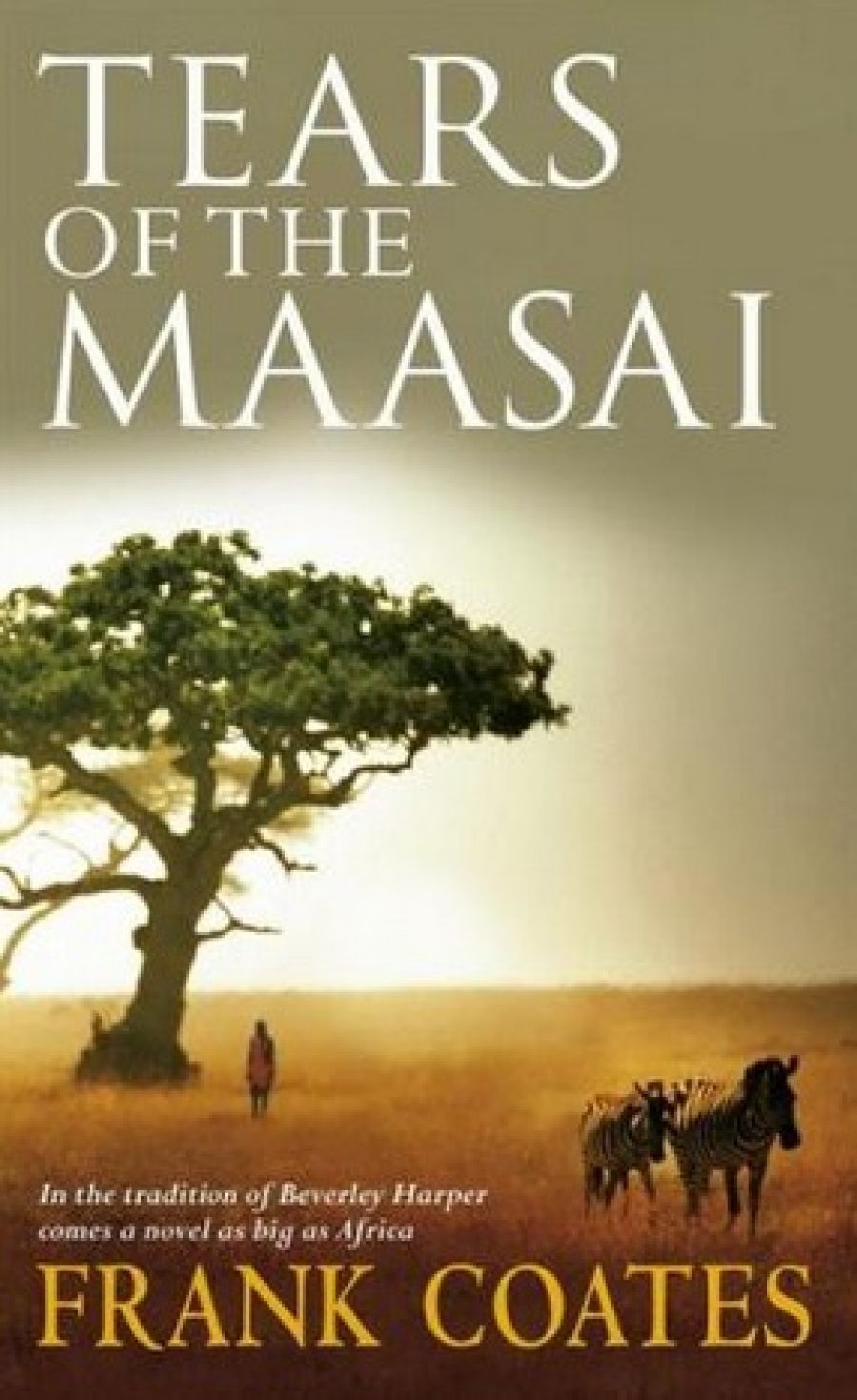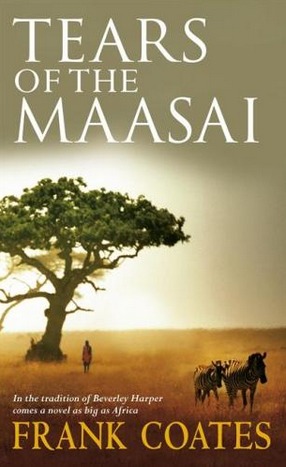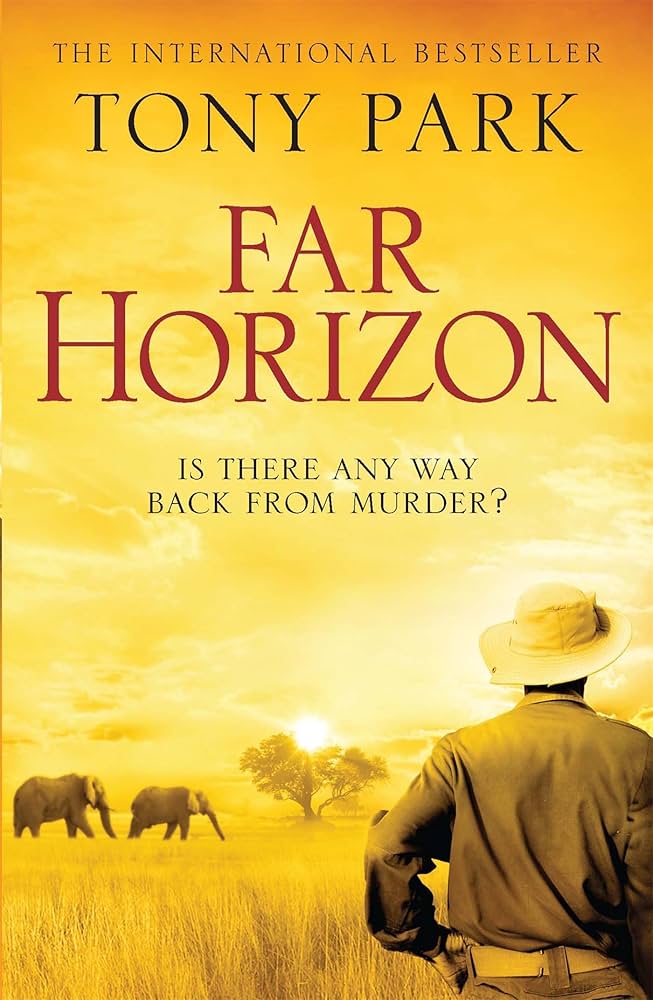
- Free Article: No
- Contents Category: Fiction
- Review Article: Yes
- Article Title: Out of Africa
- Online Only: No
- Custom Highlight Text:
According to some bright spark at HarperCollins, Tears of the Maasai is ‘a novel as big as Africa’, while Far Horizon, in the words of a creative Pan Macmillan employee, is apparently ‘driven by an emotion stronger than love, lust or fear: Revenge’. After such fanfare, what can the reader expect? Well, the usual ingredients of putative blockbusters set in Africa (and here I mean southern Africa): a nicely digestible Manichean view of the world, unredeemable villains, brawny, good-hearted heroes, feisty, long-legged heroines and plenty of fearsome wild animals. Rider Haggard forged the tradition in 1886 with the hugely popular King Solomon’s Mines, and Stuart Cloete and Wilbur Smith, among others, have also made good use of the exotic and seemingly anarchic qualities of Africa’s people, fauna and flora. One memorable scene in a Cloete novel featured an enraged buffalo licking the skin and flesh off the lower leg of a hapless man stuck not quite high enough in a tree. Where else but in Africa could you find such abundant and exquisite contrasts of harshness and beauty along with legends of buried treasure and the possibilities of antediluvian experience? It was perhaps, in Haggard’s day, an ur-land, where clichés sprouted and were happily swallowed by a goggle-eyed imperial audience back home.
- Book 1 Title: Tears of the Maasai
- Book 1 Biblio: HarperCollins, $29.95 pb, 450 pp
- Book 1 Cover Small (400 x 600):

- Book 1 Cover (800 x 1200):

- Book 2 Title: Far Horizon
- Book 2 Biblio: Macmillan, $30 pb, 416 pp
- Book 2 Cover Small (400 x 600):

- Book 2 Cover (800 x 1200):

Even in our more informed age, many of those stereotypes have stuck – from the loyal and wise kaffir to the opposite, the ruthless native – and Frank Coates and Tony Park make full use of them; but, that said, their books are remarkable in several ways. First, both authors are Australian. This is unusual, because Beverley Harper is the only other born-and-bred Australian that comes to mind who has written novels about Africa. Second, the novels are about contemporary Africa and not, like those of their predecessors, including Harper. based on colonial times. I would like to think that their publication heralds a greater awareness of, even interaction with, countries outside Australia’s own immediate ken. The professions and pastimes of both authors reflect this engagement. Coates had a stint of four years with the UN in Nairobi as a telecommunications expert and Park, who is something of a jack of all trades, as well as a major in the Australian Army Reserve, is a regular visitor to the game parks of southern Africa.
This pair of intrepid Australians has skilfully blended into their adventuresome plots accurate coverage of matters such as AIDS, big-game poaching, de-mining in Mozambique, UN projects in Kenya and the export of ivory. It is good to see postwar Mozambique feature in a novel, even if the country’s problems rather than its achievements are highlighted. There is currently underway an ambitious proposal to create one of the largest game parks in the world, whereby territory in Mozambique and Zimbabwe will be opened up to the wildlife of South Africa’s Kruger National Park. If successful, it would generate much-needed foreign currency for the two countries, as well as easing environmental pressure on the Kruger. The scheme is, however, beset with problems, one of which Tony Park reveals in the adrenaline-filled opening chapter of Far Horizon: elephants that make the border crossing to the less protected areas are immediately vulnerable. A morning’s routine work in Mozambique for Major Mike Williams of the UN’s Accelerated De-Mining Program results in the death of a famous Kruger bull elephant and two Mozambican colleagues.
The poachers are, in fact, a new breed of big-game hunters, men rich and atavistic enough to desire animal trophies: rhinoceros horn, elephant tusks, the coat of a leopard. In this case, the hunter is Orlov, a Russian, one of the get-rich-quick entrepreneurs who have surfaced in recent years, and a neatly plausible villain for Park to have conjured. Orlov and Hess, the German Namibian whom he pays to help him circumnavigate national park controls, are wonderfully odious people. The story fairly hurtles along, mustering numerous deaths, the transformation of Major Mike into the driver-tour guide of overland backpacking groups, and the kind of combat that only James Bond has been known to survive. Indeed, the final extinction of the evil Hess must surely have been written with such a film in mind.
Still, if you are going to fulfil the gung-ho prerequisites of the genre, then you might as well do it properly, and Park’s military training has evidently come in handy. His detailing of weapons and combat tactics is persuasively told. He has obviously seen enough of the overland tours to present a credible scenario of the way they operate and the kind of youngsters they attract. What turns out to be Mike’s last group includes the feisty, long-legged journalist Sarah Thatcher, whose namesake indicates her sharp-tongue and mulish determination. Far Horizon is a polished piece of entertainment, which alerts us to an ultra-modern threat to the ancient horn and ivory bearers of southern Africa.
Tears of the Maasai also includes the poaching of ivory, but it is much more ambitious as far as the regular boundaries of the genre go, and as a result both more interesting and less convincing. Coates wishes to portray the struggle of the Maasai to retain their traditions, a struggle that began in earnest in 1896 when the British finished the railway line from Mombasa into Nairobi, bringing with them the cattle disease rinderpest and smallpox. The Maasai lost half their people, many of their cattle and most of their land, but more than 100 years later they are, as a tribe, still largely intact and live in their bomas not far from the suburbs of Nairobi. Coates traces this unhappy history through the vicissitudes of a Maasai clan, the Kidongi, some of whose members were in fact spiritual Maasai leaders, known as laibons. He admits to having ‘taken many liberties in depicting the events of their lives’, but in so doing has given us a vivid picture of four generations broken apart by dispossession first and foremost, but also by greed, domestic abuse and AIDS. Coates makes the valuable and distressing point that the Maasai’s cultural integrity has not saved them from the HIV virus and may even have helped spread it. He also recreates well the spiritual life of the laibons, so that there seems nothing outlandish about their prophetic visions or, in one instance, the ability to return from death as an avenging phantom.
There is, however, something improbable about the plot. Our hero is the brawny, good-hearted, albeit terse Jack Morgan, who has joined the UN in Nairobi to escape a dark secret in his past. He falls in love with the equally troubled Malaika, a long-legged feisty Kidongi, who is busy denying her Maasai heritage and who works for AmericAid. Together with Bear, another UN employee, they are caught up in an ivory-smuggling ring led by politicians and a loathsome member of the Kidongi, who is also Malaika’s father. Corruption is undoubtedly rife in Kenya, but it seems to me a lazy cliché to use, and it reinforces one of the most damaging African stereotypes, that of the greedy bureaucrat. After all, baksheesh exists in one guise or another in every country. But the biggest problem is that Coates’s villains are not of the same deadly calibre as Park’s and his action scenes are more perplexing than heart-thumping. It is a pity, because the chapters that detail only the Maasai’s story are suffused with tenderness, authority and a relish too obviously lacking in the rest of the obligatory plot; though I like the term ‘zebra’ couple, indicative of a thoroughly modern pairing which goes some way towards undermining ancient racial prejudices.


Comments powered by CComment